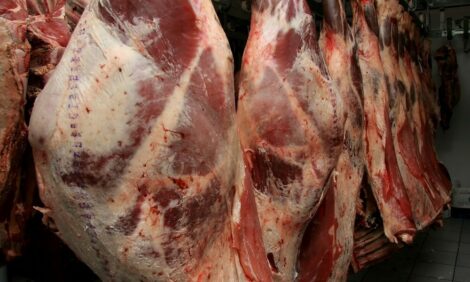



Seoul bracing for further U.S. beef import pressure
SOUTH KOREA - South Korea plans to set up a task force in preparation for further beef import pressure from the United States, government sources said Wednesday.The task force, to be made up of government quarantine experts, is expected to iron out Seoul's response to possible requests by Washington to allow bone-in beef into the country, the sources at the Ministry of Agriculture and Forestry said.
"At last week's bilateral technical committee meeting, the U.S. showed interest in gaining market access to bone-in beef, like ribs, that had been excluded from last year's import agreement," a ministry official said.
The meeting, held on Wednesday and Thursday, ended without making any headway. Seoul insisted that it will conduct inspections of all beef imports, while Washington said sample testing was sufficient and that the bone fragment issue should be resolved by importers and exporters. Quarantine officials had blocked three beef shipments totaling 22.3 tons because bone fragments were found.
In January 2003, South Korea agreed to lift its beef import ban for deboned beef from cattle less than 30 months old. This pact blocks bone-in beef from entering the country. Bone-in beef, including ribs, accounted for more than half of all beef imports before Seoul imposed a ban in late 2003 after a mad cow case was reported in the U.S.
The ministry official also said the U.S. had begun an internal review of beef safety late last year and will submit the findings to the World Organization for Animal Health this month or next month at the latest.
The organization, better known as OIE, is to look over the findings and forward its recommendations to its members within a few months.
He predicted that the OIE may agree with the U.S. beef report. This could lead to Washington asking for all limitations to be lifted on bone-in beef imports.
"As a member of the OIE, South Korea will be obliged to examine any formal recommendation made by that body," the official said. He added that there may be a need to work with other countries that share Seoul's position on this issue.
Of the 80 countries that had initially imposed import restrictions on U.S. beef after 2003, about half have lifted them, while the rest are still mulling what actions to take. Of these, South Korea and Japan provided the largest market for U.S. beef in the past.
The Agriculture Ministry, meanwhile, said there will be no changes made to its current policy of checking all U.S. beef shipments for bone fragments and that it planned to replace civilian contract veterinarians working at quarantine inspection points with government employees.
This measure is expected to improve the quality of inspections since the civilians are partially employed by beef importers, which could lead to a conflict of interest.
TheCattleSite News Desk


